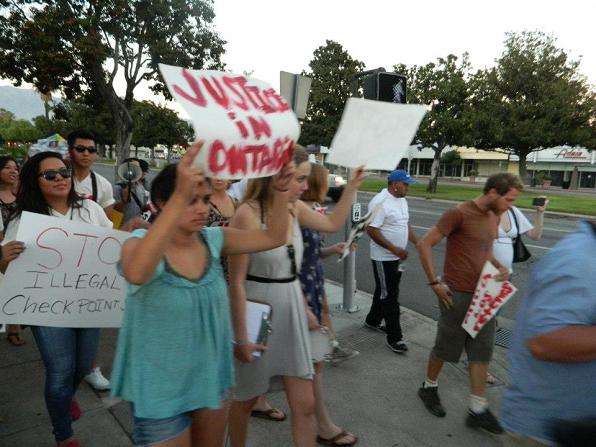In October 2011, Governor Jerry Brown signed bill AB 353 (Cedillo and Allen), changing the way police impound vehicles at checkpoints in the state. In the last few years, checkpoints, and the sheer quantity of vehicles impounded at them and held for 30 days, have spurred intense organizing campaigns throughout the state, where immigrants led the way in exposing the unjust impounds and their impacts on families and the economy. Slowly, the authorities began to respond. Municipal ordinances were passed in Cathedral City and Oakland, and amendments to existing policy took hold in Pomona and
Colton. While laws to repeal the discrimination against the undocumented in the issuing of driver's licenses continued to fail, major headway was made with AB 353.
Under the new law, which took effect in January 2012 and only applies to checkpoints, motorists whose only violation of the law is driving while unlicensed (VC 12500) are permitted until the end of the checkpoint to call a licensed driver to retrieve the car and thus avoid impound. When the vehicle is driven by someone other than the registered owner, authorities are required to make a "reasonable effort" to locate the owner of the vehicle. Furthermore, those vehicles impounded at checkpoints are now held for one, rather than 30 days.
However, proper implementation of the law has been spotty. In cities with organized efforts, such as Pomona, where checkpoint start times were moved to 9:00 PM due to community pressure, and Riverside, where organized faith groups secured the pledge of the police department to not hold checkpoints in front of houses of worship, authorities have been eager to show their compliance with the new law. But in cities where communities have been slower to respond to their oppression, or where divisions have prevented such a response, police have been much more reluctant to relinquish the revenue that impounds at checkpoints generate.
Recognizing this, vigilant activists, especially in the inland area of Southern California, began observing checkpoints carried out in the vicinity and documenting violations of the law. Among the biggest violators, they found, were the police departments in Ontario and Fontana. At the same time, Ontario residents who report checkpoints to the local checkpoint hotline reached out to Pomona activists for support in their struggle, and a new organization, as yet unnamed, was born. Armed with the documentation of the abuses, painful stories from community members, and strong support from local students, the group decided to take action amidst the backdrop of the November election campaigns.
The march, an idea that grew out of the need to create a public presence and to create awareness, began at the corner of G and Euclid, where an ample parking lot on a busy street corner provided the perfect launching place for a march to city hall. "
¡Alto a los retenes! ¡Alto a los decomisos! ¡Alto al abuso policial!" rang out the chants as curious businesspeople peered out their shop windows during the procession.
Upon arriving at the council chambers, the masses filed in to the astonished looks of city officials and staff, as well as the dropped jaws of the fire department, present to receive an award.
Speakers during the public comment period highlighted their concerns about the way the checkpoints in the city are conducted, emphasizing their simple request: that the police department respect the law and their rights. One organizer presented copies of complaints filed against the police department, as well as the text of the law, in summation of his comments.
Ontario mayor Paul Leon, revealing his utter ignorance of immigration issues, stated that his sympathy for the demand for respect of the law extended to a need for drivers to respect the law requiring a valid California license. Apparently he is unaware that for a large portion of the population of his city, obtaining a license is simply impossible.
He did, however, request that the city manager compile a report on cars impounded at the last two checkpoints carried out in the city. Candidates for city council and the assembly seat scrambled to ingratiate themselves to the activists, who welcomed the support but remained aloof from the overtures.
The community in Ontario has taken large step forward towards self-organization and holding their law enforcement officials accountable, but the vast majority of work remains to be undertaken in the coming weeks and months to ensure that the demand is met.

